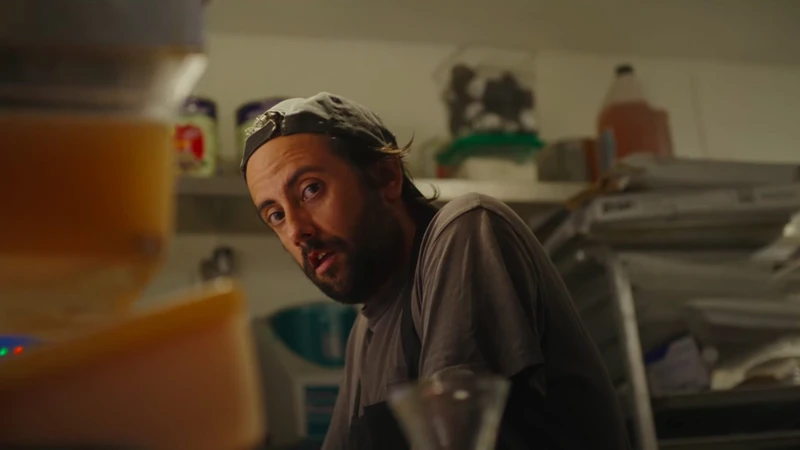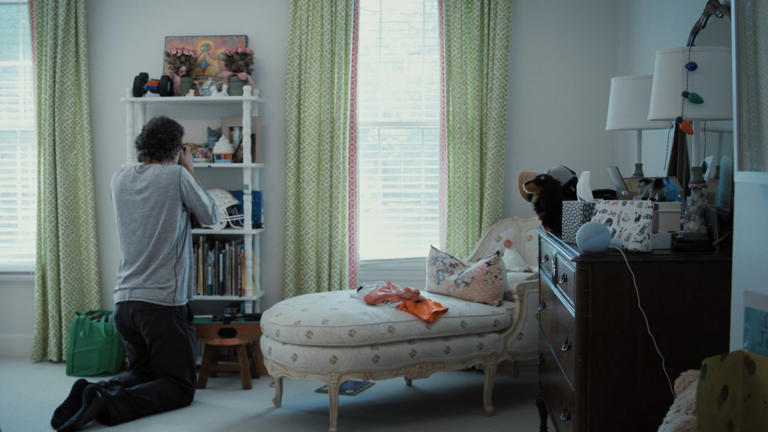TIFF50: Best of Short Cuts 5 and 6
- Brandon MacMurray
- Sep 18, 2025
- 7 min read

TIFF, as always, brought the heat this year with their short film programs. It is always so exciting to attend a festival full of world and international premieres with every program having a little mix of everything genre-wise. For Short Cuts 5 and 6 we chose to review some of our favourites from the programs including Dish Pit, Arguments in Favor of Love and All The Empty Rooms.
Dish Pit, dir. Anna Hopkins

A year and a half ago, I quit my job at a local radio station. I had no idea where I was going to work next. I needed some direction, and when I saw an opening for a hostess position at a local restaurant I had always loved, I applied, and the rest is history. I quickly became a server at the rapidly growing and constantly busy place and learned everything I had assumed about being a server (namely that it was as easy as some people made it look) was completely wrong. Working at a restaurant means joining a team of people united in a common goal: making people happy with food. I don’t work for a chain; I work for a woman named Trish who loves food and loves even more to see people’s joyful reactions to the things she cooks. Our crew seems to genuinely like each other and look out for each other. We’re loyal; if someone disrespects a member of my team, I’ll always support my co-worker. Far too many people treat us like we’re not even human, but we never fail to acknoweldge and celebrate each other’s humanity.
Working in a restaurant is a team sport. Dish Pit perfectly shows that - while you may not always know their stories (or feel comfortable probing into the lives of your co-workers) the people who work in restaurants are complex, nuanced human beings behind the job they do and the food they so lovingly create. I am proudly a front-of-house personality hire. A server, barista and bartender. But I am so much more than that. So is Joe. And so is Max.

Dish Pit, directed by Anna Hopkins, starts off with dishwasher Joe (Matthew Gouveia) and server/bartender Max (Austin Hutchings) closing down the restaurant after a long night. Max is hanging around late after one of his customers left her cell phone at the table and waiting to give it back to her. Joe’s reasons for staying are initially a little unclear as he collects ingredients to cook what turns out to be a favourite Portuguese dish that holds a lot of meaning to him. The cooking aspect of this short is perfectly filmed. The burners and oven fire up, the steak sizzles and the eggs pop and fry on the pan, a tantalizing view of a sure-to-be sumptuous meal.
Although the food looks delicious, the act of cooking and sharing a meal is so much more personal than just eating. As Max pours a beer and Joe cooks they start to open up about their lives, sharing some of their hopes and dreams. Matthew Gouveia puts on one of the best performances I saw at TIFF this year. From the beginning you can tell he is closed off and complex with a side of sarcasm. But in just 14 minutes he begins to open up just enough to get a picture of how much this seemingly random night means to him.
Overall, Dish Pit serves up a feast of food and charm and it shows how friendship can form over a hearty meal and open hearts.
Review by: Angela Schweinitz and Brandon MacMurray
Arguments in Favor of Love, dir. Gabriel Abrantes

The Portuguese director Gabriel Abrantes has become a notable figure in the new generation of Portuguese cinema with his 2018 film, Diamantino. Narrating the downfall of a disgraced footballer, Abrantes enchanted the Semaine de la Critique at the Cannes Film Festival, a sidebar section dedicated to innovative and emerging filmmakers. Following the more discreet sophomore feature, A Semente do Mal, the director participated in a different project. The Gulbenkian Modern Art Center in Lisbon invited him to develop a visual project for the Tide Line exposition. It consists of works by multiple Portuguese artists, reflecting on the Portuguese revolutionary act from 1975 to the present day.
Arguments in Favor of Love is his work for Tide Line, later expanded as a short film. It competed for the Short Films Palme d'Or at the 2025 Cannes Film Festival. Described by the director as his most personal film to date, Arguments features a couple of ghosts, voiced by actors Inês Castel-Branco and Jack Haven. In eternity, the pair reflects on modern problems in relationships, such as having children, colonialism, and political divergence, among others. Yet, while the animated ghosts verbalize their differences, Haven's ghost sings a melancholic ballad on a piano, similar to a requiem for their relationship.
At first, the film provokes strangeness with its straightforward tone on serious issues. The ghost voiced by Castel-Branco highlights the political incongruence of their partner, while the next thematic axis is the lack of children in their lives. Hence, the central reflection is contesting love in the afterlife, because the problems and conflicts are not dead, but opposed to them. One of the desires of the ghosts is to have a child, continuing their genetic lineage. However, this possibility causes embarrassment for the other partner, generating instability in their eternal love. Quoting Cher in her hit Believe, 'Do you believe in life after love?'. Abrantes does not, even if this love is in the afterlife.

The animation positions the two ghosts surrounding the wide scenario, almost as material beings, physically present there, not only in a ghostly space. The ghosts fluctuate around the empty spaces, receiving the material problems of that couple. In a sense, the arguments are heavily episodic. It is crucial to remember that this short is initially a video installation, where works usually have a fluidity between the screens and the media. The film has an adaptation of each scene, blending them into its ending of eternal love.
Consequently, Abrantes experiments with the voice performances; Castel-Branco and Haven have the liberty to create over-the-top tones in their voices. Therefore, the film revolves around the chemistry between the two ghosts. It is an interaction that goes back and forth, questioning the meanings of what it is to be a couple, even in the afterlife. Yet, the director experiments with the weirdness and strangeness in the visual sphere, especially in designing the scenes. As an example, one of the moments features the ghosts in the 69 position on a couch in a room flooded with water, a unique and equally odd segment.
Gabriel Abrantes attempts to answer what it takes to have eternal love. Yet, the result is a film that exhales the frustration and recognition that the end of the relationship is near, even in the afterlife.
Review by: Pedro Lima
All the Empty Rooms, dir. Joshua Seftel

All The Empty Rooms, the final short of the final Short Cuts program ended the festival with tears in my eyes. The short is directed by Joshua Seftel, a long-time documentarian, more recently known for his Oscar-nominated short film Stranger at the Gate. In addition, All The Empty Rooms has no shortage of big names attached to it. With distribution from Netflix and major executive producers in Adam McKay and Kim Magnusson, this is a short that is going to have a wide impact over the next year and is sure to create a ton of buzz for the Oscars (I am already penning it into my future Oscar predictions).
Being Canadian, the topic of school shootings is a bit foreign to me. Since the Polytechnique tragedy in 1989 and subsequent crackdown on gun ownership laws it is something I have mostly seen through the perspective of social media and American news. However, being able to detach myself geographically doesn’t make the pain of hearing about these tragedies on a regular basis sting any less. With that, going into this short, I had also never heard of American new correspondent Steve Hartman who is best known for his coverage of human interest stories on the CBS Evening News. All The Empty Rooms follows Steve on his seven-year long project with photographer Lou Bopp to capture the empty bedrooms of children killed in school shootings across America.

The short focuses mostly around 4 children bedrooms as Steve and the team meet with the parents of the children. Inside the bedrooms you are taken to a moment frozen in time. To say the journey through the rooms is emotional would be an understatement. The snapshot that you get is devastating. Lou Bopp captures a moment in time with detail and thoughtfulness. I found myself seeing the childhood of friends and family in so many of the victims. Like anyone, they had their hobbies, their quirks and their obsessions.
Seftel and Hartman show tremendous restraint in telling the stories of these children. They never stray away from the heart of healing. They allow a portrait of the children and their innocence to be shown and the parents a moment to heal. Never once is a shooters name said and revealed, giving all the power to the victim and no voice to the evil that committed the act. All The Empty Rooms excels at using show not tell filmmaking. The short doesn’t allow for any solution or political debate on the issue because when you are shining a light on these kids, it would only take away from the project and mission.
Seeing the life these children lived and the dreams they had for themselves aches and cuts deep. I can only hope that after watching this short it will leave people wanting change and not the empty thoughts and prayers offered up by prominent politicians, and those who have the ability to make change happen.
Review by: Brandon MacMurray



Comments